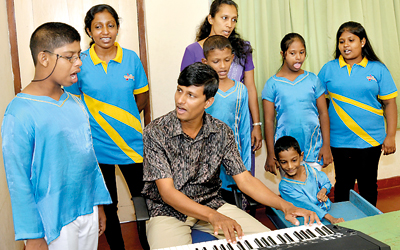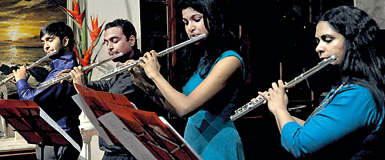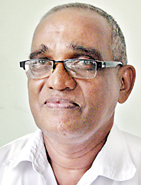Strumming their heartstrings with song
This year, Sri Lanka celebrates a centenary of special needs education. One in 93 children in the country may have Autism Spectrum Disorder and could have the need for this kind of specialized education, a recent survey has shown.

Music therapy: Nadun Hettiarachchi with his students.Pic by Susantha Liyanawatte
Sri Lanka is recognized as an inclusive country with regards to special education, in theory, says Visharadha Nadun Hettiarachchi; the founder of ‘Sanhinda’, an institute for children with special needs. “Society takes quite another view with regards to these children,” he says. “And sometimes the educational policies implemented for these children are not always practical or successful.”
This is why he pioneered the Sanhinda Institute together with Principal and Special Needs educator Apsara Alwis. At Sanhinda, they aim to provide a ‘specialized’ special education; catering to the individual needs of a child instead of taking a collective approach.
It is a practice that has worked out rather well, evidence of which you will encounter if you are fortunate enough to meet the students. They are happy and involved, singing and playing along with their teachers. Mr. Hettiarachchi approaches their education and development with an innovative approach: music therapy.
A qualified special educational music therapist, he says autistic children have a very special affinity for the aesthetics. “They’re free of the inhibitions that can often hold back other kids, so it’s very easy to reach out to them through music,” he explains.
Music therapy is commonly practised on a global scale, says Mr. Hettiarachchi. The exact science of why it works so well with Special Needs children is complex, but can be put quite simply as an approach that is “compatible with how their brain works.”
“Autistic children can be very single-minded. Once they find something that they enjoy, they can focus on that, and this in turn can enhance their brain function.”
A music lecturer at the Homagama Madya Maha Vidyalaya as well, Mr. Hettiarachchi has been practising this form of therapy for almost twelve years now. This year, for the sixth consecutive time, they plan to stage the musical concert ‘Sanhinda’, an evening of music by Mr. Hettiarachchi and his students at Sanhinda and the Homagama Madya Maha Vidyalaya.
By putting the students together through the concert, he explains that he takes his teaching one step further. “You encourage children to mix and socialize. Then they learn from each other. This is known as ‘antharkaranaya’ in Sinhala.”
The concert will be held on August 4 at the Homagama Madya Maha Vidyalaya.

























